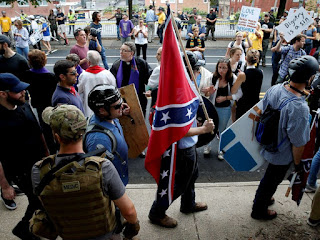Wherever you turn, there is a Holocaust memorial. The Stumbling Stones. The Topography of Terror. The Memorial to the Murdered Jews of Europe. The Memorial to the Sinti and Roma Victims of National Socialism. The Memorial to Homosexuals persecuted under Nazism. The Memorial to the Victims of National Socialist 'Euthanasia' Killings. And on and on.
After days of visiting and reflecting on these memorials, one of my students, who is African-American, asked me this question.
"The Germans seem to be trying to deal with their history with the Holocaust, " he observed. "Why doesn't America want to face up to it's history of slavery?"
His question reminded me of this post from 2016, slightly edited:
A couple of years ago I had the opportunity to lead our Study Abroad experience in Germany. During that time in Germany I was impressed with how the German people had and were continuing to reckon with their great national shame: the Holocaust.
Displaying the Nazi flag and giving the "Heil Hitler" salute are illegal in Germany.
I thought of the German ban of the Nazi flag recently when a truck in a car show here in town was proudly flying the Confederate flag as it drove past.
No one blinked or winced. People cheered and applauded.
And the question came to me, "Why don't Americans see the Confederate flag the same way the Germans view the Nazi flag?"
The answer that came to me was this: America has never reckoned with its Holocaust.
Ponder this. In the middle of Berlin there is a massive memorial to the victims of the Holocaust. Where in Washington DC is a memorial to the lives lost in the Middle Passage?
When do Americans, collectively and culturally, reckon with their guilt in the slave trade?
What happened on those slave ships and on American soil was as horrific as what happened in the Nazi concentration camps. But has the US reckoned with that legacy the same way Germany has reckoned with its Holocaust?
For example, have you ever seen or visited a Holocaust memorial in the US? Many of us have. There are numerous Holocaust memorials in the US. Almost every major US city has one.
By comparison, have you ever seen or visited a memorial to the Transatlantic slave trade?
We Americans do better mourning Nazi sins than we do facing and grieving our own.
In 2015 the Permanent Memorial to Honour the Victims of Slavery and the Transatlantic Slave Trade was unveiled on the grounds of the United Nations. That such a memorial was just erected in 2015 is stunning. That the memorial was erected by the United Nations and not the United States goes to my point.
True, you can see exhibits about the slave trade in our civil rights museums and you can experience slavery themed tours at historical sites like Monticello. But such experiences only go to reinforce the fact that America has not morally reckoned with the slave trade the way Germany has reckoned with the Holocaust.
In our museums the ugly legacy of slavery is routinely connected to exhibits of civil rights progress, from the Middle Passage to the passage of the 1964 Civil Rights Act. Such a narrative is morally consoling. These dark evil things are in the past. We've made progress. Let's move forward.
For example, in the national mall in Washington there is a memorial to Martin Luther King, Jr., the civil rights hero. We want pride rather than guilt. We memorialize racial struggle with a heroic symbol of progress. In moral contrast to Germany, there is no memorial in our national mall remembering the lives lost during the slave trade and during America's years of slavery.
America has a Holocaust. And truth be told, America has two Holocausts: Slavery and the genocide of the Native Americans.
And yet, America has never morally reckoned with either slavery or the genocide of Native Americas as Holocausts. The Confederate flag is not moralized in America the way Germans see the swastika.
And this, I would argue, is the single biggest reason America has not been able to adequately address the racial problems plaguing our nation. Because there has never been a formal and culturally sustained moral reckoning with the American Holocausts we are always starting the conversation about race from two different moral locations. African Americans and Native Americans begin with the experience of Holocaust and expect us to engage this conversation with the moral, spiritual, political, and economic seriousness a Holocaust deserves.
The rest of us? We are the Holocaust deniers.
And from those two moral locations we cannot find our way back to each other. The moral chasm is too wide.
When that Confederate flag goes by in a parade, our African American friends and neighbors see that flag as the symbol of America's Holocaust. The hulls of slave ships were the American concentration camps, the Auschwitz and Buchenwald of the Middle Passage.
The rest of us cheer and applaud the Confederate flag as a symbol of "Southern pride."
That is what separates us, at the deepest level.
The Holocaust and its deniers.
[pictures from White nationalist protests in Charlottesville, Virginia, 2017]








